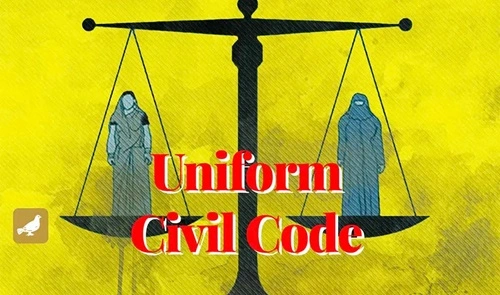The Uniform Civil Code (UCC) is one of the most debated and contentious issues in India’s political and legal landscape. Rooted in the Indian Constitution’s Directive Principles of State Policy under Article 44, the UCC envisions a single set of laws governing personal matters such as marriage, divorce, inheritance, adoption, and maintenance, applicable to all citizens regardless of their religion, caste, or community. Advocates hail it as a step towards equality and national integration, while critics argue it threatens India’s pluralistic fabric.
This article delves into the advantages and disadvantages of implementing the Uniform Civil Code in India, exploring its implications on society, culture, and governance.
Historical Context

India’s personal laws are currently governed by religious traditions and customs. For instance, Hindu personal laws govern Hindus, Buddhists, Jains, and Sikhs, while Muslims and Christians have their respective laws. This system stems from colonial rule when the British retained personal laws to avoid interfering in religious practices.
Post-independence, the framers of the Constitution debated the necessity of a UCC. While the Directive Principles encouraged its implementation, the Constitution also granted freedom to all citizens to practice their religion, creating a delicate balance between secularism and pluralism. Despite decades of discussions, the UCC remains unimplemented, with successive governments either supporting or opposing it based on political and societal factors.
Advantages of a Uniform Civil Code
1. Equality Before Law
The UCC would ensure equal rights and obligations for all citizens, irrespective of religion or gender. It would eliminate discriminatory practices such as triple talaq (which has already been abolished) and polygamy, fostering gender justice. A common legal framework would uphold the constitutional guarantee of equality under Article 14.
2. Gender Justice
Personal laws have often been criticized for perpetuating gender inequality. For instance, under some interpretations of Islamic law, men have unilateral rights in divorce and inheritance. The UCC can rectify these disparities, ensuring women are treated equally in matters of inheritance, marriage, and maintenance.
3. National Integration
A common civil code could promote national unity by transcending religious and cultural divisions. It would create a sense of belonging and equality among citizens, reducing the potential for communal strife over legal disparities.
4. Simplification of Laws
The coexistence of multiple personal laws complicates the legal system and often leads to confusion in judicial proceedings. A UCC would simplify legal processes, making them more transparent and accessible to citizens.
5. Modernization of Society
A Uniform Civil Code would signify India’s progress as a modern, secular nation-state. By codifying laws that are not based on religious practices, the UCC could encourage a move towards a more rational, scientific, and egalitarian society.
6. Alignment with Global Standards
Many countries, including the United States, the United Kingdom, and France, have a uniform set of civil laws for their citizens. Implementing the UCC in India would align the nation with global practices, enhancing its international image as a progressive democracy.
Disadvantages of a Uniform Civil Code
1. Threat to Religious Freedom
Critics argue that the UCC may infringe on the right to freedom of religion guaranteed under Article 25 of the Constitution. By mandating a single set of laws, the UCC could dilute the cultural and religious identity of various communities.
2. Erosion of Cultural Diversity
India is celebrated for its cultural pluralism, where communities coexist with distinct customs and traditions. The UCC, if perceived as homogenizing diverse practices, could lead to resentment and alienation among minorities.
3. Political Sensitivities
The issue of the UCC is often politicized, with some accusing its proponents of using it as a tool for majoritarianism. This perception could exacerbate communal tensions, particularly if minority communities feel targeted.
4. Practical Challenges
Drafting and implementing a UCC that respects India’s diversity while ensuring equality is a herculean task. Addressing deeply entrenched personal laws across communities would require sensitive handling and extensive consultations.
5. Opposition from Minority Communities
Many minority groups, especially Muslims and Christians, perceive the UCC as an imposition of Hindu-majority customs. This mistrust can create significant hurdles in building consensus for its implementation.
6. Fear of Legal Uniformity Turning Arbitrary
Uniformity does not always translate to fairness. Critics argue that a one-size-fits-all approach may overlook the nuanced needs and rights of different communities, leading to potential injustice.
Current Status of the UCC in India
The debate over the UCC has resurfaced repeatedly in political and judicial arenas. In 2018, the Law Commission of India concluded that a UCC is “neither necessary nor desirable at this stage,” advocating instead for reforms within existing personal laws to address inequities.
In recent years, various states and political parties have included the UCC in their manifestos, reigniting the conversation. However, attempts to introduce the UCC on a national level have faced resistance from religious groups, civil society organizations, and political opponents.
Some states, such as Goa, have implemented a version of the UCC in the form of a common civil code applicable to all residents. This model is often cited as a potential blueprint for nationwide implementation, though its feasibility in larger, more diverse states remains debatable.
The Way Forward
Given the complexities of India’s social fabric, implementing a UCC requires careful planning and inclusive dialogue. Some suggestions for achieving this balance include:
- Incremental Reforms: Instead of enforcing a UCC overnight, reforms within existing personal laws can address immediate concerns of gender justice and equality. For example, revisiting inheritance laws and marriage practices in a phased manner can prepare the ground for broader acceptance of a UCC.
- Extensive Consultations: Engaging with religious leaders, community representatives, and legal experts is crucial to drafting a UCC that respects India’s diversity while upholding constitutional principles.
- Education and Awareness: Promoting awareness about the UCC’s intent and potential benefits can help dispel misconceptions and foster trust among communities.
- Learning from Global Practices: Studying the experiences of countries with uniform civil codes can offer valuable insights into crafting a framework suited to India’s unique needs.
Conclusion
The Uniform Civil Code is an ambitious vision for a diverse and democratic nation like India. While its advantages in terms of equality, gender justice, and national integration are undeniable, the challenges it poses to cultural diversity and religious freedom cannot be ignored. The UCC, if implemented, must strike a delicate balance between upholding constitutional ideals and preserving India’s pluralistic ethos.
As the debate continues, the focus must remain on fostering an inclusive, equitable society that respects the rights and aspirations of all its citizens. The UCC may not be a panacea, but with careful deliberation and consensus-building, it has the potential to become a cornerstone of India’s democratic evolution.

